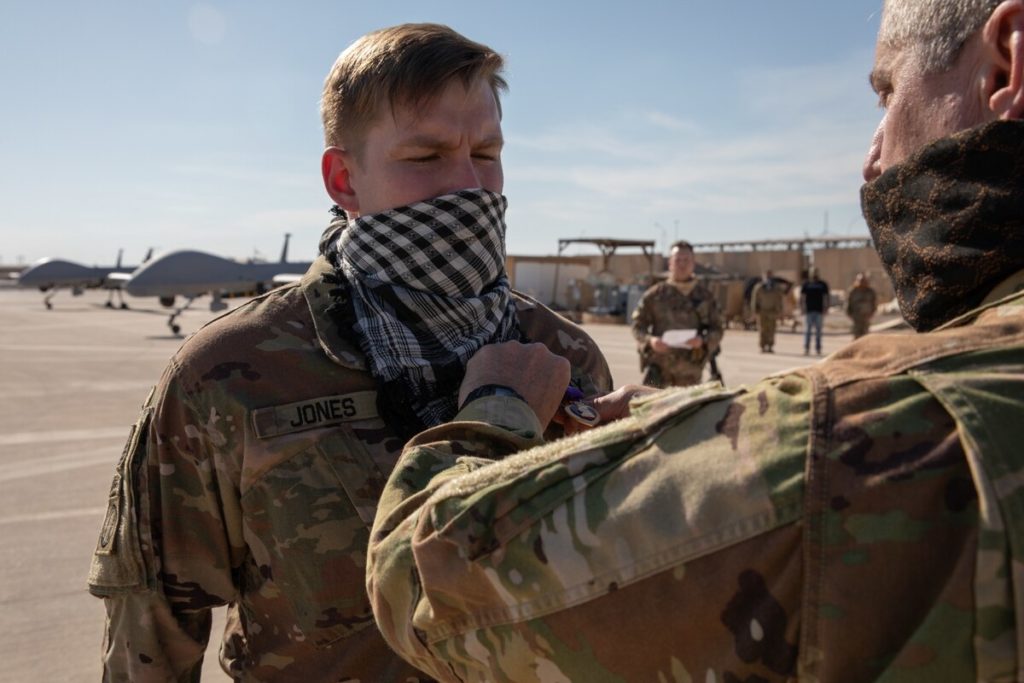
Four months ago, as retaliation for the U.S strike that killed the Iranian Quds force commander, General Qassem Soleimani, Iran launched more than a dozen ballistic missiles targeting two air bases in Iraq. Eleven of those missiles struck Ain al-Assad air base where approximately 1,000 U.S. troops were based.
First, Trump touted “No Americans were harmed in last night’s attack by the Iranian regime. We suffered no casualties. All of our soldiers are safe…”
After the Pentagon announced that several troops had indeed been injured, diagnosed with traumatic brain injuries (TBI), the commander in chief “classified” the injuries suffered by our troops as just “headaches and a couple of other things…not very serious”
Eventually, the Pentagon reported that 110 service members had been diagnosed with mild traumatic brain injuries from the missile attack. Several of the injured troops were air-evacuated to medical facilities in Germany and Kuwait and some went on to the United States for additional treatment. Some returned to duty in Iraq.
Lt. Gen. Pat White, commander of Combined Joint Task Force-Operation Inherent Resolve, U.S. Central Command (CENTCOM), has now approved Purple Hearts for 29 of the soldiers injured in the Jan. 8 attack.
In all, 80 Purple Heart recommendations were evaluated by CENTCOM.
The first six Purple Hearts have already been awarded to U.S. Army soldiers in Kuwait and Iraq and the remaining medals will be presented later this week.

Photo:SYDNEY MARIETTE/U.S. ARMY)
General White has the final authority to approve the award of the Purple Heart for the Army soldiers recommended. Air Force Lt. Gen. Joseph Guastella, the Air Force Central Command commander, is the final approving authority for airmen who have been recommended.
One hopes the commander in chief, who referred to the injuries as “headaches,” will not – once again – interfere in the decisions made by his military commanders.
Coda:
It has not always been the case that Traumatic Brain Injuries (TBI) — often referred to as one of the “signature wounds” of the Iraq and Afghanistan wars – were recognized as injuries qualifying for the award of the Purple Heart.
While military regulations still exclude PTSD as one of the injuries or wounds qualifying for award of the Purple Heart, after an oft-times heated debate and vigorous lobbying by U.S. military psychologists, medical experts and combat veterans, the Army, in 2011, clarified its criteria for awarding the Purple Heart to soldiers suffering from certain enemy caused, blast-related TBIs.
Eligibility criteria for the award of the Purple Heart now include
• Concussion injuries caused as a result of enemy generated explosions
• Mild traumatic brain injury or concussion severe enough to cause either loss of consciousness or restriction from full duty due to persistent signs, symptoms, or clinical finding, or impaired brain functions for a period greater than 48 hours from the time of the concussive incident.
Please read more on the history of the Purple Heart here.
Finally, there is still an ongoing debate on both making certain PTSD/PTSI cases eligible for award of the Purple Heart and for changing the “diagnostic label” from Post-Traumatic Stress Disorder to Post Traumatic Stress Injury, because of the stigma associated with the diagnosis “disorder” and the concern that it has discouraged too many soldiers from understanding the condition and seeking proper treatment.
Note: This post has been edited to clarify that while some cases of TBI qualify for award of the Purple Heart, PTSD still does not.
















